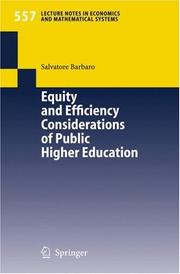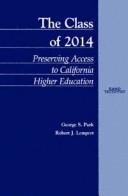| Listing 1 - 7 of 7 |
Sort by
|

ISBN: 9786610901968 1402055609 1402055595 9781402055591 Year: 2007 Volume: v. 18 Publisher: Springer Netherlands
Abstract | Keywords | Export | Availability | Bookmark
 Loading...
Loading...Choose an application
- Reference Manager
- EndNote
- RefWorks (Direct export to RefWorks)
"Financing Public Universities" addresses newer practices of resource allocation which tie funding to indicators of performance. The gist of these efforts is to raise the quality of institutional systems. Performance-based budgeting and funding of public universities is part of broader efforts to reform public management, and it is being promoted and implemented by various government agencies around the globe. In particular, European universities with their normally strong governmental ties, or higher education systems molded on European universities, are prime targets of such reforms. Performance funding has made its inroads in attempts to grant university systems managerial autonomy: autonomy was to be granted in exchange for funding modes which are tied to the measurement of performance indicators. Unfortunately, performance-based budgeting or funding measures cannot meet the various expectations: they do not raise the quality of teaching or learning; they do not raise research performance; they take back a great deal of managerial autonomy which is commonly judged to be essential for the well being of higher education institutions, in particular research universities; and they act as automata in place of proper governance and management. "Financing Public Universities" addresses policy makers, higher education administrators, scholars and students of higher education management. After an introduction to the theme and to the book (Chapter 1), "Financing Public Universities" covers the evolvement of mass higher education and the associated curtailment of funding (Chapter 2), the public management reform debate (Chapter 3) within which performance-based budgeting or funding evolved (Chapter 4), sketches alternative governance and management modes which can be used instead (Chapter 5), and epitomizes inertia or challenges (Chapter 6). Four appendices cover more technical matters, such as a comparative exposition of the research performance of universities by nation (Appendix C) and examples of funding systems in the UK and in the USA (Appendix D). The author of this book is a former university administrator who finally became a researcher. This unusual background provides the author with a special understanding of university management but also, as a privileged observer, with a profound insight on university life. (.......) This book is a basic tool for understanding universities in a period of reforms and transformations. Jose-Gines Mora, Technical University of Valencia, President of the EAIR The present compendium by Marcel Herbst is of great help for all those who are involved in reflecting about and shaping the future of higher education and research. The reader will find an abundance of information and many comparisons of existing systems as well as suggestions for future developments. The author offers the reader not only a description of the actual situation. The reader will also find a wealth of challenging personal views which may help his of her own process of reflection. Jakob Nuesch, President emeritus, Swiss Federal Institute of Technology in Zurich (ETH Zurich).
Universities and colleges --- Government aid to higher education. --- Finance. --- Education, Higher --- State aid to higher education --- Government aid --- Finance --- 378.6 --- 378.6 Interuniversitaire instituten --(algemeen) --- Interuniversitaire instituten --(algemeen) --- Government aid to higher education
Book
ISBN: 1281430110 9786611430115 0833044478 0833043218 9780833044471 9780833043214 9781281430113 6611430113 Year: 2008 Publisher: Santa Monica, CA : RAND,
Abstract | Keywords | Export | Availability | Bookmark
 Loading...
Loading...Choose an application
- Reference Manager
- EndNote
- RefWorks (Direct export to RefWorks)
In the late 1990's, the Korea Ministry of Education and Human Resources, in response to concern over the relatively low standing of the nation's universities and researchers, launched the Brain Korea 21 program BK21. BK21 seeks to make Korean research universities globally competitive and to produce more high-quality researchers in Korea. It provides fellowship funding to graduate students and professors in research groups at top Korean universities. Concentrating on the second phase of BK21, which will continue until 2012, the authors develop quantitative and qualitative models and methods to evaluate how well BK21 is fulfilling its goals and make suggestions for further stimulating Korean university research.
Education, Higher. --- Electronic books. --- Education, Higher --- Government aid to higher education --- Finance --- Finance. --- Brain Korea 21 (Project) --- Evaluation. --- State aid to higher education --- College students --- Higher education --- Government aid --- Education --- BK21 --- Tunoe Hanʾguk 21 (Project) --- Universities and colleges --- Postsecondary education
Book
ISBN: 1421416913 9781421416915 9781421416908 1421416905 Year: 2015 Publisher: Baltimore Johns Hopkins University Press
Abstract | Keywords | Export | Availability | Bookmark
 Loading...
Loading...Choose an application
- Reference Manager
- EndNote
- RefWorks (Direct export to RefWorks)
"One of the striking ways in which state governments have pursued better performance in public higher education is through the use of performance funding. Performance funding involves tying state support directly to institutional performance on specific outcomes such as rates of graduation and job placement. The principal rationale for performance funding has been that the introduction of market-like forces will prod institutions to become more efficient, delivering "more bang for the buck." Kevin Dougherty, an expert on state performance funding, finds its development puzzling. First, despite the great interest in it, only half the states have ever adopted performance funding for higher education. Moreover, of the states that did adopt performance funding, over half later dropped it. Finally, in the states that have retained performance funding over a long period of time, their programs have undergone considerable changes in the amount of state funding they devote to performance funding and in the content of the indicators they use to allocate that funding. In spite of this, performance funding continues to attract interest as a way of improving educational outcomes. This book, based on an extensive ten-state study, aims to shed light on the social and political factors affecting the origins, evolution, and demise of these programs"-- "Performance funding ties state support of colleges and universities directly to institutional performance on specific outcomes, including retention, number of credits accrued, graduation, and job placement. The theory is that introducing market-like forces will prod institutions to become more efficient and effective. In The Politics of Performance Funding for Higher Education, Kevin J. Dougherty and Rebecca S. Natow explore the sometimes puzzling evolution of this mode of funding higher education. Drawing on an eight-state study of performance funding in Florida, Illinois, Indiana, Missouri, Ohio, South Carolina, Tennessee, and Washington, Dougherty and Natow shed light on the social and political factors affecting the origins, evolution, and demise of these programs. Their findings uncover patterns of frequent adoption, discontinuation, and re-adoption.Of the thirty-six states that have ever adopted performance funding, two-thirds discontinued it, although many of those later re-adopted it. Even when performance funding programs persist over time, they can undergo considerable changes in both the amount of state funding and in the indicators used to allocate funding. Yet performance funding continues to attract interest from federal and state officials, state policy associations, and major foundations as a way of improving educational outcomes.The authors explore the various forces, actors, and motives behind the adoption, discontinuation, and transformation of performance funding programs. They compare U.S. programs to international models, and they gauge the likely future of performance funding, given the volatility of the political forces driving it. Aimed at educators, sociologists, political scientists, and policy makers, this book will be hailed as the definitive assessment of the origins and evolution of performance funding"--
SOCIAL SCIENCE / Sociology / General. --- POLITICAL SCIENCE / Public Policy / General. --- EDUCATION / Higher. --- Education, Higher --- Universities and colleges --- Government aid to higher education. --- College students --- Higher education --- Postsecondary education --- State aid to higher education --- Economic aspects --- Finance. --- Education --- Government aid --- Finance

ISSN: 00758442 ISBN: 1280411821 9786610411825 3540285156 3540261974 Year: 2005 Volume: 557 Publisher: Berlin, Heidelberg : Springer Berlin Heidelberg : Imprint: Springer,
Abstract | Keywords | Export | Availability | Bookmark
 Loading...
Loading...Choose an application
- Reference Manager
- EndNote
- RefWorks (Direct export to RefWorks)
It has become part of the conventional wisdom in the economics of education that subsidies to higher education have a regressive distributional effect. Given that relatively more children from wealthier families enroll in higher education, many economist assume that these subsidies to higher education have an unwanted distributional impact. This volume presents new empirical evidence for the cross-sectional point of view and provides an analytical framework for the longitudinal perspective. The present volume also analyzes the equity and efficiency effects of widely-discussed funding reforms and proposes a voluntary graduate tax.
Government aid to higher education --- Tax incidence --- Social choice --- Evaluation. --- Mathematical models. --- Incidence of taxation --- Tax burden --- Tax equity --- Taxation --- Tax shifting --- Education, Higher --- State aid to higher education --- Universities and colleges --- Government aid --- Finance --- Public finance. --- Economic policy. --- Public Economics. --- Economic Policy. --- Economic nationalism --- Economic planning --- National planning --- State planning --- Economics --- Planning --- National security --- Social policy --- Cameralistics --- Public finance --- Currency question --- Public finances --- 378 --- 378 Hoger onderwijs. Universitair onderwijs --(algemeen) --- Hoger onderwijs. Universitair onderwijs --(algemeen) --- Evaluation --- Mathematical models

ISBN: 0585344671 9780585344676 0833026143 9780833026149 Year: 1998 Publisher: Santa Monica Rand
Abstract | Keywords | Export | Availability | Bookmark
 Loading...
Loading...Choose an application
- Reference Manager
- EndNote
- RefWorks (Direct export to RefWorks)
Universities and colleges --- College attendance --- Government aid to higher education --- Education, Higher --- Education --- Social Sciences --- Theory & Practice of Education --- College students --- Higher education --- Postsecondary education --- State aid to higher education --- Academic probation --- Attendance, College --- College enrollment --- Probation, Academic --- University attendance --- School attendance --- Colleges --- Degree-granting institutions --- Higher education institutions --- Higher education providers --- Institutions of higher education --- Postsecondary institutions --- Public institutions --- Schools --- Admission --- Forecasting. --- Costs --- Forecasting --- Government aid --- Finance
Book
ISBN: 9264234225 9789264234222 Year: 1990
Abstract | Keywords | Export | Availability | Bookmark
 Loading...
Loading...Choose an application
- Reference Manager
- EndNote
- RefWorks (Direct export to RefWorks)
State aid to higher education --- Education, Higher --- Aide de l'Etat à l'enseignement supérieur --- Enseignement supérieur --- Economic aspects --- Aspect économique --- 378 --- 371.014.543 --- AA / International- internationaal --- 476 --- 351.3 --- 470 --- 336.025 --- Economie van de opvoeding. --- Openbaar bestuur: onderwijs. --- Openbaar onderwijs: algemeenheden. --- Uitgaven voor onderwijs en opvoeding. --- Government aid to higher education --- Aide de l'Etat à l'enseignement supérieur --- Enseignement supérieur --- Aspect économique --- Economie van de opvoeding --- Openbaar bestuur: onderwijs --- Openbaar onderwijs: algemeenheden --- Uitgaven voor onderwijs en opvoeding
Book

ISBN: 331949435X 9783319494364 3319494368 Year: 2017 Publisher: Cham : Springer International Publishing : Imprint: Palgrave Macmillan,
Abstract | Keywords | Export | Availability | Bookmark
 Loading...
Loading...Choose an application
- Reference Manager
- EndNote
- RefWorks (Direct export to RefWorks)
This book examines how Performance or Outcomes Based Funding (POBF) policies impact racial equity in higher education. Over the last decade, higher education has become entrenched in a movement that holds colleges and universities more accountable to its supporters. There are pressures to answer questions about student outcomes and performance, the value of education, the effectiveness of instructors, and the ability of existing leaders to manage efficiently and effectively. It is within this climate that states have adopted POBF policies. Through POBF, public colleges and universities receive state funding through formulas that no longer rely solely on student enrollment, but are instead based on student outcomes. This book provides an overview for policymakers of how racial equity has been addressed, the impact of these approaches, and recommendations for moving forward. .
Education. --- School management and organization. --- School administration. --- Educational policy. --- ducation and state. --- Assessment. --- Higher education. --- Higher Education. --- Administration, Organization and Leadership. --- Educational Policy and Politics. --- Assessment, Testing and Evaluation. --- Education, Higher --- Competency-based education --- Government aid to higher education. --- Finance. --- State aid to higher education --- Competency training --- OBE (Education) --- Outcome-based education --- Outcomes-based education --- Performance-based education --- Government aid --- Education --- Universities and colleges --- Finance --- Education, Higher. --- Educational tests and measuremen. --- College students --- Higher education --- Postsecondary education --- Education and state. --- Education policy --- Educational policy --- State and education --- Social policy --- Endowment of research --- Administration, Educational --- Educational administration --- Inspection of schools --- Operation policies, School --- Policies, School operation --- School administration --- School inspection --- School operation policies --- School organization --- Schools --- Management --- Organization --- Government policy --- Inspection --- Management and organization
| Listing 1 - 7 of 7 |
Sort by
|

 Search
Search Feedback
Feedback About
About Help
Help News
News